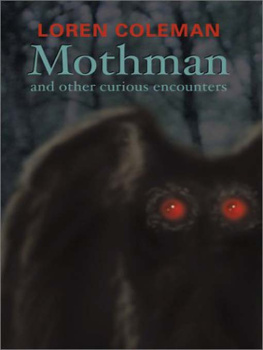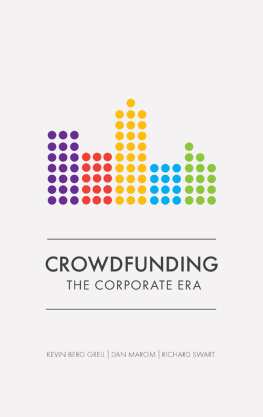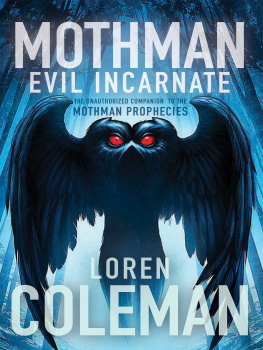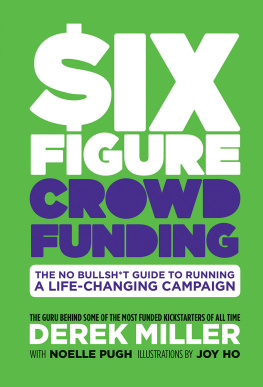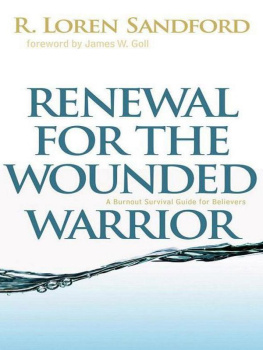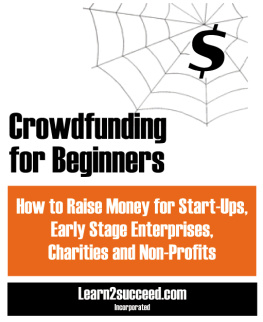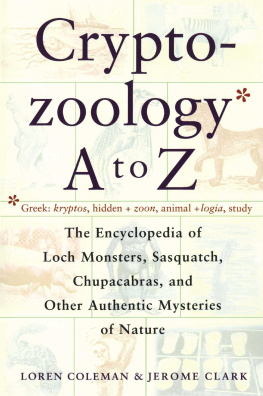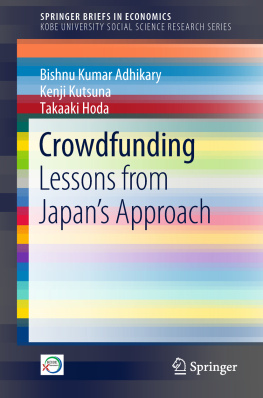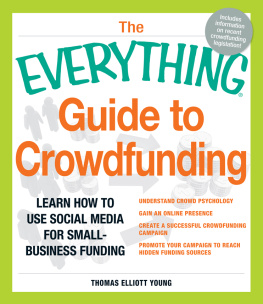Loren L. Coleman - Crowdfunding Your Fiction: A Best Practices Guide
Here you can read online Loren L. Coleman - Crowdfunding Your Fiction: A Best Practices Guide full text of the book (entire story) in english for free. Download pdf and epub, get meaning, cover and reviews about this ebook. publisher: Pulse Publishing, genre: Home and family. Description of the work, (preface) as well as reviews are available. Best literature library LitArk.com created for fans of good reading and offers a wide selection of genres:
Romance novel
Science fiction
Adventure
Detective
Science
History
Home and family
Prose
Art
Politics
Computer
Non-fiction
Religion
Business
Children
Humor
Choose a favorite category and find really read worthwhile books. Enjoy immersion in the world of imagination, feel the emotions of the characters or learn something new for yourself, make an fascinating discovery.
- Book:Crowdfunding Your Fiction: A Best Practices Guide
- Author:
- Publisher:Pulse Publishing
- Genre:
- Rating:5 / 5
- Favourites:Add to favourites
- Your mark:
- 100
- 1
- 2
- 3
- 4
- 5
Crowdfunding Your Fiction: A Best Practices Guide: summary, description and annotation
We offer to read an annotation, description, summary or preface (depends on what the author of the book "Crowdfunding Your Fiction: A Best Practices Guide" wrote himself). If you haven't found the necessary information about the book — write in the comments, we will try to find it.
Crowdfunding Your Fiction: A Best Practices Guide — read online for free the complete book (whole text) full work
Below is the text of the book, divided by pages. System saving the place of the last page read, allows you to conveniently read the book "Crowdfunding Your Fiction: A Best Practices Guide" online for free, without having to search again every time where you left off. Put a bookmark, and you can go to the page where you finished reading at any time.
Font size:
Interval:
Bookmark:


This guide would not be possible without the generous time afforded to me over the years by mentors, peers, and friends; so many of which refused to let me properly thank them. If any of them read this, and you know who you are, let me just say: It wasnt nothing. I did worry about it. And Ive tried to pay it forward.
This book is another installment on that debt.
More specifically, I need to call out the following Kickstarter campaign creators who sat for interviews, agreed to read sections (or the entire first draft) of this guide, or otherwise challenged me on any number of topics to help refine my thinking. If you find this guide useful, please watch for the following names and thank them as well by supporting one of their future campaigns.
Dean Wesley Smith
Kristine Kathryn Rusch
Michael J. Sullivan
Robin Sullivan
Phillip Reed
Michael A. Stackpole
Matt Forbeck
Michael Richie
Curt Covert
Jon Auerbach
John Rogers
J. T. Krul
Michelle Joy Soffe
Connor Alexander
Matt Buchman
Franklin Ard
I was learning and teaching at a writers retreat with more than fifty other professional fiction writers. We spent several days in a classroom setting, listening and taking notes as various pros taught some of the very best of their hard-earned knowledge. In the evenings we had a Green Room suite where we could all hang out and talk shop. Craft. Business. Cover design. Markets.
One evening, I made a point of bringing up crowdfunding.
I already knew quite a bit on the subject, having studied crowdfunding platforms for nearly a decade while running several campaigns under Kickstarters Tabletop Gaming category including a $2.6 Million campaign in late 2019. I had also consulted on several dozen other campaigns in the Gaming and Fiction Publishing categories, and (more recently) run my first small Publishing campaign with my son for a small Zine.
Why did I plan a $1,000 campaign only a few months after a $2.6M showing? For the same reason I was at the writers retreat. To learn. Because I believed (and still do) that publishing is a greatly underserved market in crowdfunding. I wanted to test new ideas and get other writers excited about the concept of a crowdfunded fiction market.
I never thought it would be such a hard sell.
This was in early 2020. At this point, the indie movement was well into its second decade, and many writers at this retreat were making a good living selling their story collections and novels on Amazon, through Kobo or Draft2Digital, using Patreon or Bundle Rabbit. Several presenters were specialists on automated email lists, blogging, audiobooks. Self-starters. Self-promoters. Damn good writers.
When I polled the room, only four writers even admitted to having tried a crowdfunding platform like Kickstarter or GoFundMe. Two related successful stories; but they did it almost apologetically.
My favorite:
Yeah, I ran a Kickstarter a few years ago. (Emphasis mine). I wanted help funding new cover art for the novels I was self-publishing. But I raised only $5,000.
Me: Repeat that last sentence again. Out loud, please.
I raised only $5,000? Okay, yeah. I said only.
Me: Have you ever earned $5,000 off your fiction before? In just thirty days?
No.
Me: And have you since?
No.
Me: Have you tried running another campaign in the years since?
Uh, no.
This was from a writer whose work I like and respect, and would read more if he would simply publish more. Id have backed his crowdfunding campaign in a heartbeat. I wouldnt have been able to give him my money fast enough! I told him so, right there in front of a room full of other writers.
Its been over a year since that conversation.
Im still waiting for an invite to his second campaign.
Also at this discussion was a writer I was just getting to know. Amazing fantasy work. He was also one of the best self-promoters Id met at this retreat, and was shamelessly making the IngramSpark POD (Print On Demand) system do things Im not sure they realized it could do. I was impressed, and I dont impress easily.
He also managed a direct-sale email list that generated hundreds of sales at the release of each new novel or story collection. Thats not a bad launch day for an indie. So, with that kind of initial push, I asked him why he hadnt tried running a Kickstarter.
Our conversation was a long (fun) and winding path. Its even better when a good debater gives me such an easy last word:
It just seems like a lot of work for the reward.
Me: Youve already cleared the early hurdle by developing a good marketing list of first-day buyers.
Thats because Im already on all the platforms.
(Awkward pause.)
Me: Obviously, not.
This writer saw Kickstarter and other crowdfunding sites like he saw MailChip or Drip; as a marketing platform, not a sales platform.
Heres the thing, though: Its both.
Shortly after the retreat I started writing this Best Practices guide, leaning on what I knew running successful Tabletop campaigns, but adjusting expectations toward applying that knowledge to Publishing. I posted an early (much shorter) version on a friends TEACHABLES web page and helped several writers plan out Publishing campaigns on Kickstarter. In the year, since, Ive consulted on another dozen campaigns in the Fiction category, and run a second successful campaign for $12,000 in funding.
Im finding that a lot of the skills I learned studying and running TableTop Gaming campaigns translate well into Publishing. They take a little adjustment here and there, mostly because Publishing hasnt hit the same critical mass in audience as Gaming, but the potential is there. Every writer I help improves the market for us all.
Thats what Im hoping to do. Help every writer.
Improve the market.
After youre done reading this, I hope youll give it a try.
Loren L. Coleman
There is nothing in this Best Practices guide you cant learn for yourself with enough research time and a little trial and error. I want to be clear on that right up front. There is no secret template. No cheat code to game the algorithms. Crowdfunding rewards ingenuity and hard work.
Writers should be familiar with both.
The purpose of this guide is to help you trim time youd have wasted getting started, focus your early research, and offer some specific knowledge I (and others) have field-tested and continue to use when building and running our own campaigns. To remove those early fears, and help prevent you for making the worst of the early mistakes.
Simple as that.
This is the obligatory So Just What Is CrowdfundingAnyway? section.
In its simplest form, Kickstarter is a little bit eBay, a little bit Etsy, and a whole lot of speculation. You have a project you want to create. A story. A board game. A piece of technology. You post your idea on the crowdfunding market and make a promise: If X number of people agree to give you Y dollars each, you will create the item in Z amount of time and send all your backers a copy.
Font size:
Interval:
Bookmark:
Similar books «Crowdfunding Your Fiction: A Best Practices Guide»
Look at similar books to Crowdfunding Your Fiction: A Best Practices Guide. We have selected literature similar in name and meaning in the hope of providing readers with more options to find new, interesting, not yet read works.
Discussion, reviews of the book Crowdfunding Your Fiction: A Best Practices Guide and just readers' own opinions. Leave your comments, write what you think about the work, its meaning or the main characters. Specify what exactly you liked and what you didn't like, and why you think so.


